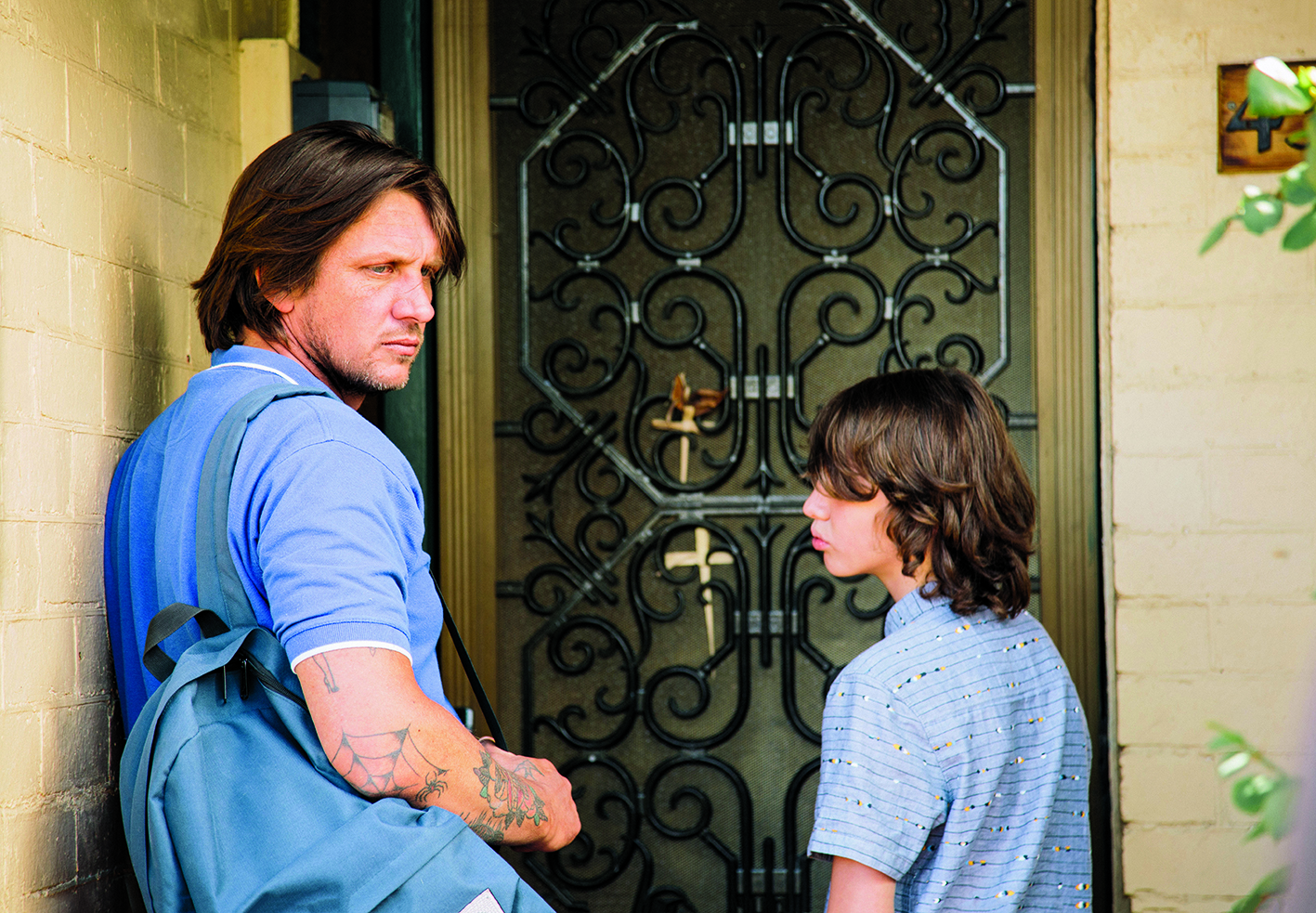On the surface, Jason Raftopoulos’ debut feature, West of Sunshine (2017), is a domestic drama about a day in the life of a man doing what he has to to survive with his son by his side. In another place and time, one could see the story transposed, more or less intact, to Ken Loach’s social-realist renditions of the streets of England. The film’s press material even compares it to Bicycle Thieves (Vittorio De Sica, 1948) and The Wrestler (Darren Aronofsky, 2008),[1]Exile Entertainment, West of Sunshine press kit, 2017, p. 6. although doing so doesn’t necessarily help this intimate independent film, given there is already an entire local history that it nicely fits into.
Premiering in the 2017 Venice Film Festival’s Orizzonti sidebar, with its first Australian screening at the 2018 Sydney Film Festival, West of Sunshine is based on Raftopoulos’ short film Father’s Day (2011).[2]Panos Apostolou, ‘West of Sunshine: A Film Exploring the Impact of Gambling in a Father–Son Relationship’, SBS Greek, 30 May 2018, <https://www.sbs.com.au/yourlanguage/greek/en/audiotrack/film-exploring-impact-gambling-father-son-relationship-2018>, accessed 1 August 2018. The feature follows hapless and feckless package-delivery driver Jim (Damian Hill), who has forgotten he has to take care of his young son, Alex (Ty Perham), that day while also having to deal with an escalating debt to loan shark Banos (Tony Nikolakopoulos). When Jim’s boss, clearly exhausted by his continued unreliability, forbids the young boy from joining Jim and delivery partner Steve (Arthur Angel) in their van because of insurance concerns, Jim revs up his vintage car – the sole object of worth left to him by his dad – and father and son head out together.
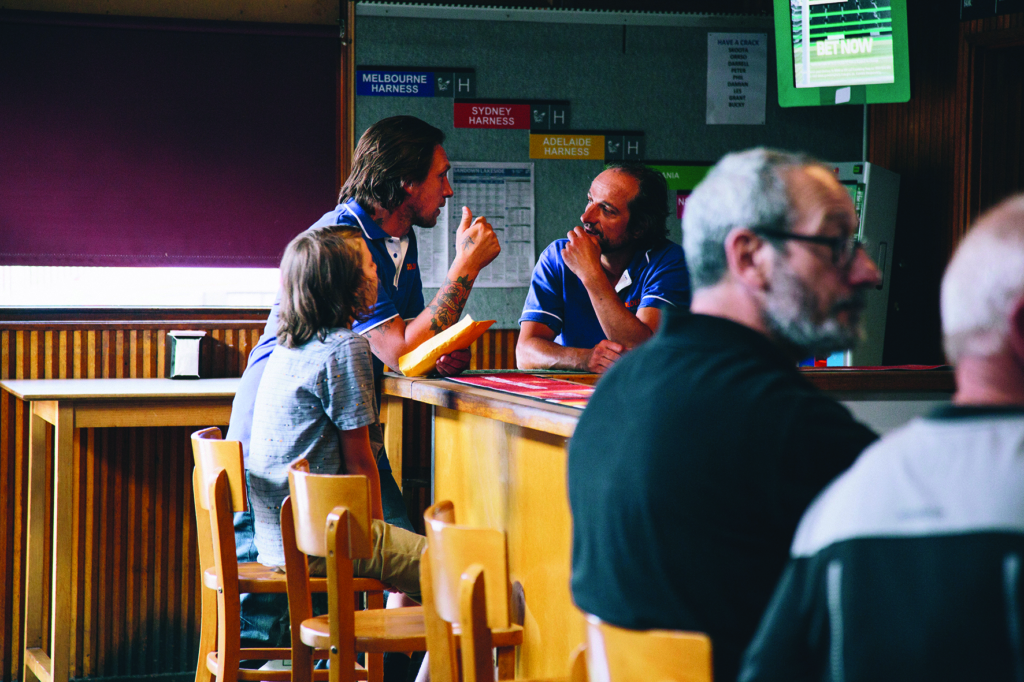
With the debt deadline looming over his head – Banos demands repayment by the end of the day – Jim has one last attempt to set things square thanks to a hot tip on the horses. When, naturally, Jim’s worse predilections kick in, he must think fast of a way to get the money. An old friend, Mel (Kat Stewart), who deals drugs out of her seemingly aboveboard bakery, hires Jim to make the daily rounds, but again Jim gets in his own way and things don’t work out. As dusk approaches, Jim finds himself running out of options – and running out of ways to make sure his son doesn’t think any less of him than he already does.
Jim is what we would call a right ol’ fuck-up. He seems like a nice-enough bloke: dim, but sufficiently good-looking and charming that we understand why the women around him stick around longer than they probably tell themselves they ought to. He’s also that archetypal Australian male character that prioritises his automobile over everything else, that’s greedy and short-tempered, and whose adult life is a mess. We’ve seen this sort of man before, and not necessarily just in the movies; he’s far too familiar within Australian culture.
Despite its pitch-perfect lead, unfortunately, I found the narrative of West of Sunshine underwhelming. It very much has the feel of a short film stretched to feature length, with several extraneous sequences – like those involving is-she-or-isn’t-she girlfriend Jenny (Eliza D’Souza) – offering little beyond further proof that Jim is a bit of a loser.
West of Sunshine tries to reclaim that sense of idealism for a better life … despite its lead character’s continued struggle with gambling and the difficulties of co-parenting with an ex, the film’s view of the city is decidedly rosy.
Place and time
Raftopoulos himself has described West of Sunshine as ‘a thesis on love, free will and intergenerational trauma’ and an exploration of ‘how a person deals with the cycle of loss and abandonment, what they do to relieve themselves of that pain and how they find the strength and insight to break free of patterns and start again’.[3]Jason Raftopoulos, ‘Director’s Notes’, in Exile Entertainment, op. cit., p. 5. That certainly sounds about right for a film comparing itself to the work of De Sica – though, in reality, there isn’t enough here to justify such grandiose statements.
Where the film succeeds beyond its performances – Hill is particularly noteworthy, and the other cast members shine even in smaller roles – is in developing its setting as a character in its own right. We often hear this spoken of with regard to New York (think: Martin Scorsese, Woody Allen, Sex and the City), Los Angeles (Michael Mann, Paul Thomas Anderson, Entourage), and elsewhere across the US and Europe, but rarely about locations in Australia. Compounding this, Australian filmmakers often get criticised (wrongly, I would suggest) for creating stories that are too ‘dark and depressing’, ‘rubbish’ and ‘horrible’,[4]Cited in Karl Quinn, ‘Why Won’t We Watch Australian Films?’, The Sydney Morning Herald, 26 October 2014, <https://www.smh.com.au/entertainment/movies/why-wont-we-watch-australian-films-20141024-11bhia.html>, accessed 1 August 2018. ignoring the lives of those of us who aren’t drug-addicted, serial-killing rapists from the bush (a generalisation, albeit a fair one). But a cursory glance at our film history suggests otherwise – and it is a streak that the director is smart to continue. Raftopoulos clearly knows Melbourne and its suburbs well, and it’s because of how ingrained this terrain is in the filmmaker that West of Sunshine’s story works at all. And, while the specifics of Melbourne’s suburban sprawl may be lost on some, the mechanics similarly apply to any other metropolis where the dream of the ‘Aussie battler’ is increasingly harder to attain, especially for those who no longer fit into the evolving identity of the city.
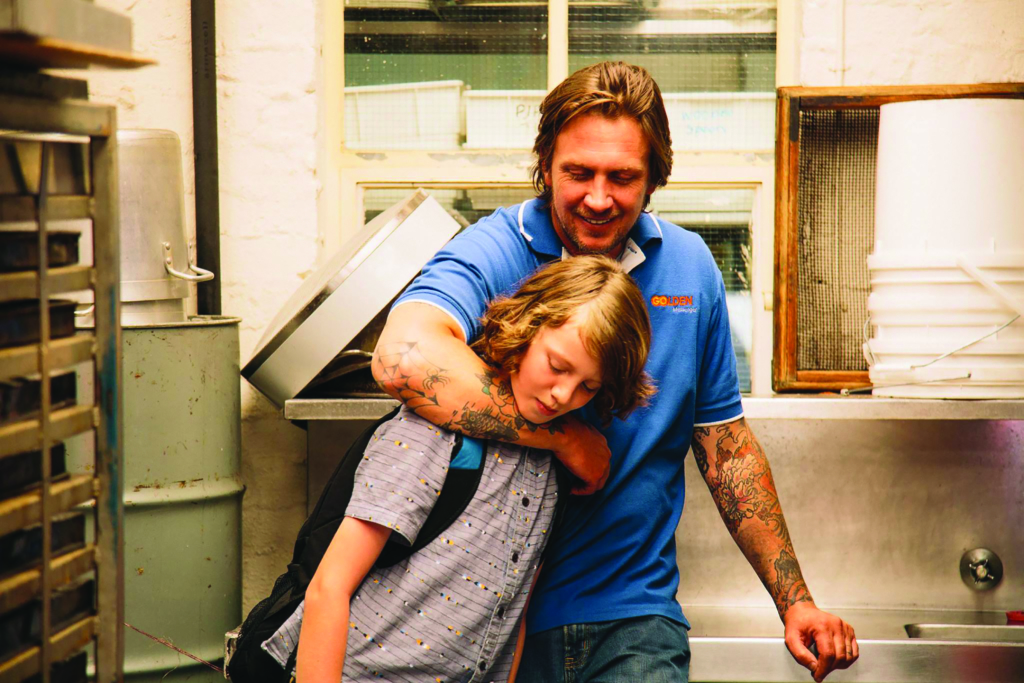
Having grown up in Geelong, an hour west of Melbourne’s city centre, and later living just a few hops off the train from Sunshine itself, I am familiar with the landscape within which Raftopoulos places his characters. My childhood memories of family trips to Melbourne for Australian Football League (AFL) matches at the Melbourne Cricket Ground, Waverley Park and Whitten Oval are interspersed with memories of the multicultural boom around the Queen Victoria Market in North Melbourne, dinners on pre-redeveloped Lygon Street in Carlton as cars hooned past and commercials for Franco Cozzo’s seemingly endless grand sale (‘Megalo! Megalo! Megalo!’) beaming out of our own car’s radio.
Beyond these recollections, I do feel connected to the suburbs of Melbourne through cinema, and it’s in the tradition of films like these that West of Sunshine works best. Movies like Spotswood (Mark Joffe, 1992) and Death in Brunswick (John Ruane, 1990) evoke, even in 2018, a very tangible idea of the Melbourne suburbs that give them their names. Others, as varied as Malcolm (Nadia Tass, 1986), Head On (Ana Kokkinos, 1998) and Love and Other Catastrophes (Emma-Kate Croghan, 1996), live and die on their sense of place, depicting milieus built around the specific cultures of the people inhabiting them. West of Sunshine is actually more interesting if you imagine Jim being the grown-up version of, for example, Ben Mendelsohn’s car-crazy Danny from The Big Steal (Tass, 1990) or Vince Colosimo’s Vinnie from Street Hero (Michael Pattinson, 1984). These are all films about characters who struggle with money and heartbreak, sometimes resorting to crime, failing as often as they succeed. They are about communities; they are stories of the immigrant experience and the desire of individuals to make a life for themselves beyond the lot they were given. They represent the people who, in retrospect, are the last vestiges of Australia’s inner-urban working class, aspiring to the so-called Aussie dream.
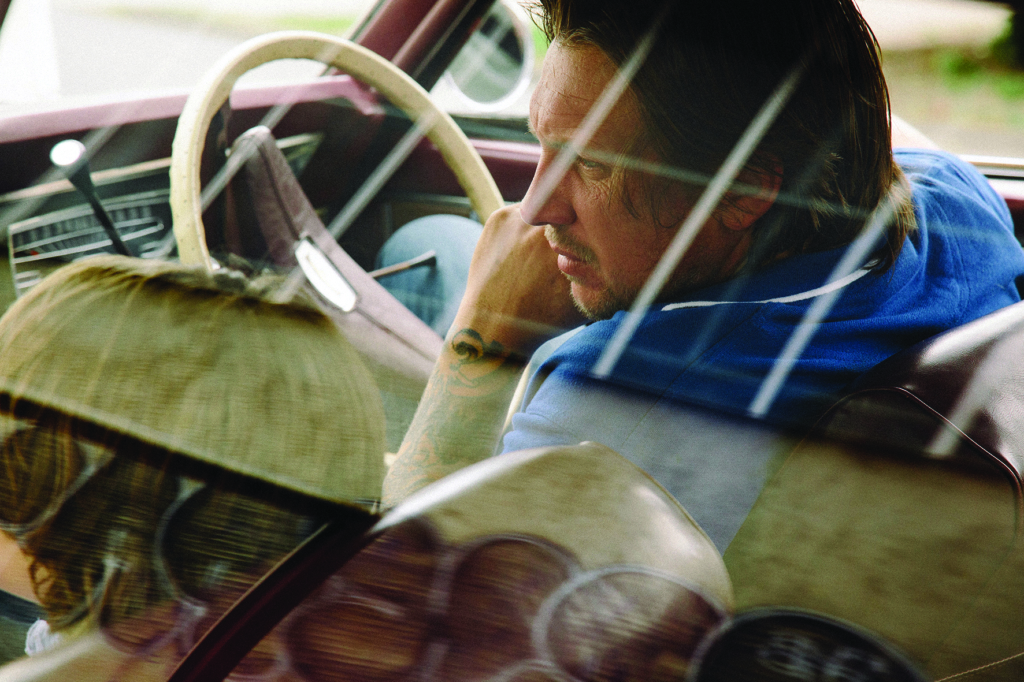
A changing city
While the refineries along the Yarra and Maribyrnong rivers, with their large cylindrical towers and steel cranes, are still here today, their status as symbols of the region’s identity has diminished. Melbourne’s western suburbs were once enclaves for immigrants – ethnic hubs where a film’s daydreaming protagonist could look out from their window at night and see the horizon lit up with the tantalising glow of a skyscraper’s fluorescent lights. Now, they are overwhelmingly gentrified, with houses that sell for millions and modern apartment blocks that rise up like Lego towers.
But, as the geography and socioeconomic make-up of the city changes, so must the films that portray it. And they have, for the most part. Today’s Melbourne is captured in films like Ali’s Wedding (Jeffrey Walker, 2017) and Falling for Sahara (Khoa Do, 2011) and in television series like SBS’s Sunshine, which focus less on characters’ class and status, as determined by where they live, and more on the characters redefining what it means to be Australian in the first place. Filmmakers are homing in on new – and further-out – areas of everchanging suburbia, and we are increasingly seeing the stories of those with Asian, African and Indigenous heritage, going beyond the simplistic views of these communities as ‘boat people’, ‘thugs’ and ‘dole bludgers’.
West of Sunshine tries to reclaim that sense of idealism for a better life (notwithstanding the outcome) that was once so common in cinematic stories about Melbourne’s suburbs. Despite its lead character’s continued struggle with gambling and the difficulties of co-parenting with an ex, the film’s view of the city is decidedly rosy. Thom Neal’s cinematography bathes the film in golden natural light, which – unlike some recent Melbourne-set works, like the crime procedural Noise (Matthew Saville, 2007) and Footscray-set realist drama Pawno (Paul Ireland, 2015) – highlights the beauty of the area that can be eclipsed by the grim plights of the hard-done-by characters. In a way, we can see why Jim would want to be a better person, if it means being able to finally take in the obvious beauty that is around him.
It seems contemporary local filmmaking is going to great lengths to accurately portray the fluctuating demographics of Australian suburbia. Yet, unfortunately and surprisingly, Raftopoulos pulls back. I say ‘surprisingly’ because the short film that West of Sunshine is based on featured a Greek father and son. The feature film misses the potential frisson that could have arisen from the clash between the short film’s protagonist’s older, more traditional working-class Greek identity and the changing Australian society around him, including some among the third-generation Greek population who now wear suits and buy renovated houses in areas their parents could not have afforded. Even with an Anglo lead, some texture and shading could have been gained from going beyond whether or not Jim will be able to pay back the loan shark and regain the respect of his child. I wanted the film to tell us something about the realities of a man like Jim living where he does in the Australia of today, especially since Raftopoulos has said he wanted to explore ‘mythological stories that repeat’.[5]Jason Raftopoulos, quoted in Apostolou, op. cit. West of Sunshine simply doesn’t achieve this. It may show us Jim’s hardships through the lens of a single day, but we are left blind to the broader contemporary nitty-gritty of working-class Australian life.
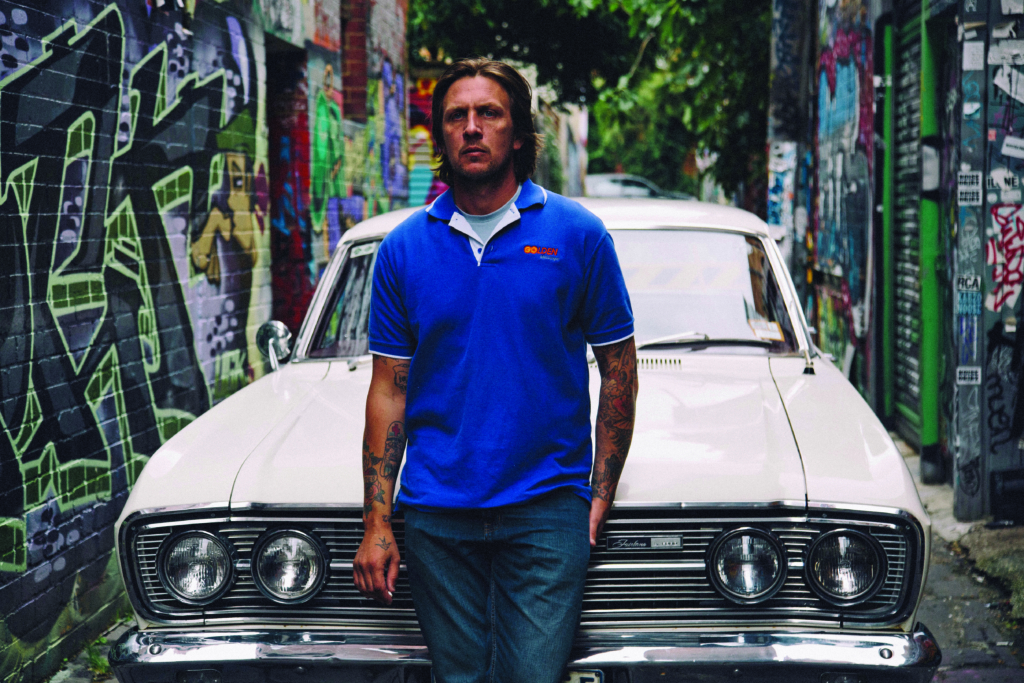
The image I am left with is that of Jim, with his scruffy face and tattoos, cruising through the streets of Melbourne in his vintage car, an everyman unnaturally dressed in a uniform, doing what he must to survive. The visual is perhaps too obvious a symbolic representation of his place in the world – a man for whom life, just one generation earlier, would have been very different – but, in the moment, it works. Filmed in only eighteen days,[6]Exile Entertainment, op. cit., p. 6. West of Sunshine, its well-meaning if tepid drama aside, is impressive in many respects. But anybody with firsthand knowledge of the demands of this world will likely find that this film barely scratches the surface.
Endnotes
| 1 | Exile Entertainment, West of Sunshine press kit, 2017, p. 6. |
|---|---|
| 2 | Panos Apostolou, ‘West of Sunshine: A Film Exploring the Impact of Gambling in a Father–Son Relationship’, SBS Greek, 30 May 2018, <https://www.sbs.com.au/yourlanguage/greek/en/audiotrack/film-exploring-impact-gambling-father-son-relationship-2018>, accessed 1 August 2018. |
| 3 | Jason Raftopoulos, ‘Director’s Notes’, in Exile Entertainment, op. cit., p. 5. |
| 4 | Cited in Karl Quinn, ‘Why Won’t We Watch Australian Films?’, The Sydney Morning Herald, 26 October 2014, <https://www.smh.com.au/entertainment/movies/why-wont-we-watch-australian-films-20141024-11bhia.html>, accessed 1 August 2018. |
| 5 | Jason Raftopoulos, quoted in Apostolou, op. cit. |
| 6 | Exile Entertainment, op. cit., p. 6. |
